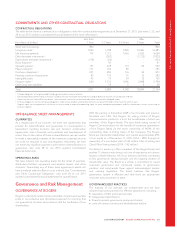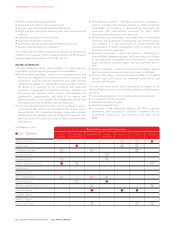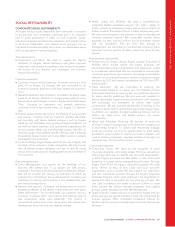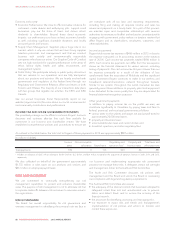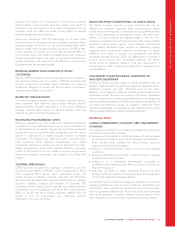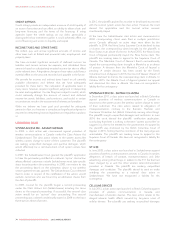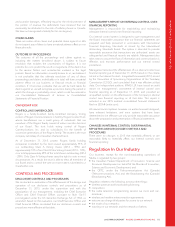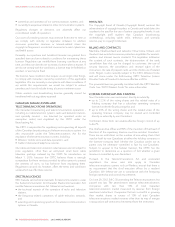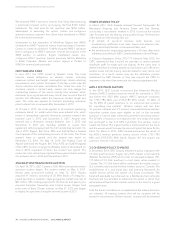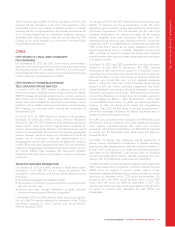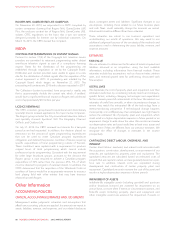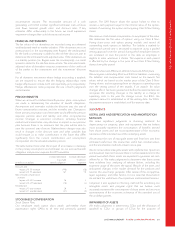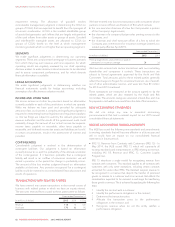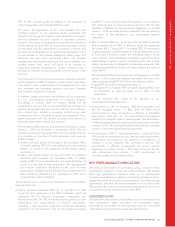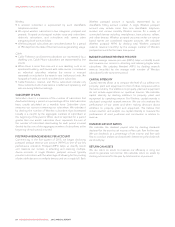Rogers 2015 Annual Report Download - page 76
Download and view the complete annual report
Please find page 76 of the 2015 Rogers annual report below. You can navigate through the pages in the report by either clicking on the pages listed below, or by using the keyword search tool below to find specific information within the annual report.MANAGEMENT’S DISCUSSION AND ANALYSIS
CREDIT RATINGS
Credit ratings provide an independent measure of credit quality of
an issuer of securities and can affect our ability to obtain short- and
long-term financing and the terms of the financing. If rating
agencies lower the credit ratings on our debt, particularly a
downgrade below investment grade, it could adversely affect our
cost of financing and access to liquidity and capital.
INCOME TAXES AND OTHER TAXES
We collect, pay, and accrue significant amounts of income and
other taxes such as federal and provincial sales, employment, and
property taxes.
We have recorded significant amounts of deferred income tax
liabilities and current income tax expense, and calculated these
amounts based on substantively enacted income tax rates in effect
at the relevant time. A legislative change in these rates could have a
material effect on the amounts recorded and payable in the future.
We provide for income and indirect taxes based on all currently
available information and believe that we have adequately
provided for these items. The calculation of applicable taxes in
many cases, however, requires significant judgment in interpreting
tax rules and regulations. Our tax filings are subject to audits, which
could materially change the amount of current and deferred
income tax assets, liabilities, and provisions, and could, in certain
circumstances, result in the assessment of interest and penalties.
While we believe we have paid and provided for adequate
amounts of tax, our business is complex and significant judgment is
required in interpreting how tax legislation and regulations apply to
us.
LITIGATION RISKS
SYSTEM ACCESS FEE – SASKATCHEWAN
In 2004, a class action was commenced against providers of
wireless communications in Canada under the Class Actions Act
(Saskatchewan). The class action relates to the system access fee
wireless carriers charge to some of their customers. The plaintiffs
are seeking unspecified damages and punitive damages, which
would effectively be a reimbursement of all system access fees
collected.
In 2007, the Saskatchewan Court granted the plaintiffs’ application
to have the proceeding certified as a national, “opt-in” class action
where affected customers outside Saskatchewan must take specific
steps to participate in the proceeding. In 2008, our motion to stay
the proceeding based on the arbitration clause in our wireless
service agreements was granted. The Saskatchewan Court directed
that its order, in respect of the certification of the action, would
exclude customers who are bound by an arbitration clause from
the class of plaintiffs.
In 2009, counsel for the plaintiffs began a second proceeding
under the Class Actions Act (Saskatchewan) asserting the same
claims as the original proceeding. If successful, this second class
action would be an “opt-out” class proceeding. This second
proceeding was ordered conditionally stayed in 2009 on the basis
that it was an abuse of process.
In 2013, the plaintiffs applied for an order to be allowed to proceed
with the second system access fee class action. However, the court
denied this application and the second action remains
conditionally stayed.
At the time the Saskatchewan class action was commenced in
2004, corresponding claims were filed in multiple jurisdictions
across Canada, although no active steps were taken by the
plaintiffs. In 2014, the Nova Scotia Supreme Court declined to stay
or dismiss the corresponding claim brought by the plaintiffs in
Nova Scotia as an abuse of process. In April 2015, the Nova Scotia
Court of Appeal permanently stayed the Nova Scotia claim. The
plaintiffs are seeking leave to appeal to the Supreme Court of
Canada. The Manitoba Court of Queen’s Bench unconditionally
stayed the corresponding claim brought in Manitoba as an abuse
of process. A decision from the Manitoba Court of Appeal is
pending. A similar decision has been issued by the British
Columbia Court of Appeal. In 2015, the Court of Queen’s Bench of
Alberta declined to dismiss the corresponding claim in Alberta. In
October 2015, the Alberta Court of Appeal granted our appeal
and dismissed the claim in Alberta. We have not recognized a
liability for this contingency.
SYSTEM ACCESS FEE – BRITISH COLUMBIA
In December 2011, a class action was launched in British Columbia
against providers of wireless communications in Canada in
response to the system access fee wireless carriers charge to some
of their customers. The class action related to allegations of
misrepresentations contrary to the Business Practices and
Consumer Protection Act (British Columbia), among other things.
The plaintiffs sought unspecified damages and restitution. In June
2014, the court denied the plaintiffs’ certification application,
concluding that there is nothing in the term “system access fee” to
suggest it is a fee to be remitted to the government. An appeal by
the plaintiffs was dismissed by the British Columbia Court of
Appeal in 2015, finding that the conclusion of the trial judge was
unassailable. The plaintiffs are seeking leave to appeal to the
Supreme Court of Canada. We have not recognized a liability for
this contingency.
911 FEE
In June 2008, a class action was launched in Saskatchewan against
providers of wireless communications services in Canada. It involves
allegations of breach of contract, misrepresentation, and false
advertising, among other things, in relation to the 911 fee that had
been charged by us and the other wireless telecommunication
providers in Canada. The plaintiffs are seeking unspecified
damages and restitution. The plaintiffs intend to seek an order
certifying the proceeding as a national class action in
Saskatchewan. We have not recognized a liability for this
contingency.
CELLULAR DEVICES
In July 2013, a class action was launched in British Columbia against
providers of wireless communications in Canada and
manufacturers of wireless devices. The class action relates to the
alleged adverse health effects incurred by long-term users of
cellular devices. The plaintiffs are seeking unspecified damages
74 ROGERS COMMUNICATIONS INC. 2015 ANNUAL REPORT



